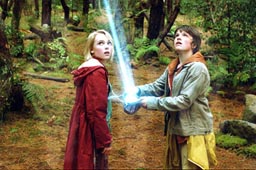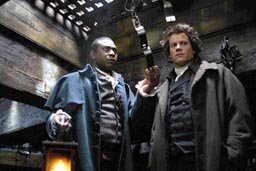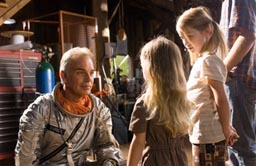It seems February, with the focus on the Oscars--and the interminable wait for spring--brings out serious family film fare. All four movies reviewed here can be classified as family films, but none of them are "kiddie" films. All deal with serious subject matter, except for "Epic Movie," which takes serious subject matter and serves it sliced and diced.
Reviews In This Article
'Bridge to Terabithia'
'Amazing Grace'
'The Astronaut Farmer'
'Epic Movie' 
 You may have heard by now that "Bridge to Terabithia" is a charming movie about the power of imagination. You’ve probably also figured out that the producers asked reviewers not to reveal the major plot twist, and I don’t know if this request has served them well or not. I’ve gotten quite a few emails from parents who know I screen films, asking what the "dark turn" is. And I’ve got to tell you, a “dark turn” in a film can mean a lot of disturbing things these days. On the other hand, I heard of some kids who learned what this dark turn is, but since reviewers don’t discuss it and how it’s handled, they’re afraid to go to the film.
You may have heard by now that "Bridge to Terabithia" is a charming movie about the power of imagination. You’ve probably also figured out that the producers asked reviewers not to reveal the major plot twist, and I don’t know if this request has served them well or not. I’ve gotten quite a few emails from parents who know I screen films, asking what the "dark turn" is. And I’ve got to tell you, a “dark turn” in a film can mean a lot of disturbing things these days. On the other hand, I heard of some kids who learned what this dark turn is, but since reviewers don’t discuss it and how it’s handled, they’re afraid to go to the film.
So, feeling it needs to be discussed, I will be vague and say that one of the film’s characters dies an unexpected accidental death. It’s the unexpected part with which I have a quibble. The book, "Bridge to Terabithia," is the journey of one young man’s road to adulthood. And, as in all well-written books, the major events are foreshadowed. It doesn’t quite have the blunt opening line of "Love Story," say, but you pretty much can tell what’s coming and how it affected the lead character and drove him to tell the story.
On the other hand, in the film, the death seems completely out of the blue. There’s no set up at all. It happens off screen and you never see a body or a funeral, so in a way it seems more like an academic plot point than an emotional one. Both my kids were perplexed rather than disturbed by it. Therefore, neither of them thought that was what the film was really about, because they couldn’t relate. (They also both wanted a sequel with the lost person now alive and well in the imaginary kingdom.)
In a way it's good, since the film is about a lot of terrific things that do deserve more focus. It’s about the power of imagination, the power of friendship, the realization that everyone around you--including your friends, siblings, teachers, parents, even the bullies--have whole lives you likely know little about. But mostly, the Kingdom of Terabithia is the Kingdom of the Imagination, where the two lead children have the power to become the people they once only imagined they might be.
"Bridge to Terabithia" is a well-made movie, and I do recommend it for children as young as nine. Oddly, I wish the death had been more affecting. But the way it is, it’s a movie about the magic of imagination that shouldn’t give anybody bad dreams--and just might lead to the development of a few more backyard kingdoms of enchantment.
Amazing Grace  "Amazing Grace" is probably the best possible movie that could be made about the passing of a bill in parliament. In that sentence lies both the delight and challenge of the film. While it is certainly a biography of English reformer William Wilberforce and the story of how slave trade was eventually outlawed by England (decades before it was in America, embarrassingly enough), it is structurally the story of the constant defeat and final passing of the bill outlawing slavery. Sort of "1776" without the music. (Well, okay, there is this one song.)
"Amazing Grace" is probably the best possible movie that could be made about the passing of a bill in parliament. In that sentence lies both the delight and challenge of the film. While it is certainly a biography of English reformer William Wilberforce and the story of how slave trade was eventually outlawed by England (decades before it was in America, embarrassingly enough), it is structurally the story of the constant defeat and final passing of the bill outlawing slavery. Sort of "1776" without the music. (Well, okay, there is this one song.)
But the delight of the film is how terrifically it’s made. The actors, led by Ioan Gruffudd, are fantastic, and the direction of Michael Apted is inspired. Usually movies that feature characters that are driven by a specific faith are made with either apology or bluster by artists of that faith. In this circumstance, while Wilberforce’s strong Christian faith certainly drives him, you see his faith in the context of who he is, what the fabric of society is, and the conflicts it brings the character both internally and externally.
Faith becomes the fabric of the film. And scenes of faith that could be painfully direct with lesser actors somehow become so universal and inspiring that filmgoers of other faiths will likely be able to identify.
The script by Steven Knight is also terrific . It bounces between three time frames, which are mostly kept straight by Wilberforce's physical health status. Finally, the film tells the story of how hard it is to fight for something you believe in when the victory is not swift and decisive, but drawn out and debilitating--and how crucially important it is not to give up. It also looks at the issue of slavery, which, chillingly, is still an issue alive today.
The film doesn’t actually take you into the lives of slaves or onto a ship filled with humans for sale. Because this is a movie of ideas and not an action film, kids below middle school age might find it boring. But viewers of any faith who want to be stirred to act on their principles will find encouragement. It’s also a strong reminder that the world doesn’t usually change for the better by accident. It takes faith, dedication, and perseverance. 
 "The Astronaut Farmer" is another film about ideas. While the target audience for this one is undoubtedly adults in danger of giving up their dreams, both my 9-year-old daughter and 12-year-old son found it engaging.
"The Astronaut Farmer" is another film about ideas. While the target audience for this one is undoubtedly adults in danger of giving up their dreams, both my 9-year-old daughter and 12-year-old son found it engaging.
It’s the story of a man named Charles Farmer (winningly played by Billy Bob Thornton), who had to quit NASA because of his father’s death, and his determination ever since to build his own rocket and circle the earth just once in outer space. He’s gotten his whole family, including his wife and three children, to share his dream. Of course, his dream has caused huge problems. The bank is foreclosing because he’s spent all his money building the rocket. The fuel to propel him into space will cost $50,000 he doesn’t have. And the townsfolk, of course, think he’s crazy.
The premise of "The Astronaut Farmer" is an allegory of when "going to the moon" meant accomplishing that which was once deemed impossible. It also raises good questions about whether "space" belongs to everyone or can be regulated by specific governments. But mostly it’s a parable about what happens to people when they finally settle for the ordinary--or refuse to do so.
So while Charles Farmer’s dreams might not be as earth-changing as those of William Wilberforce, it is an inspiring testament to not letting go of who you might become and what you might accomplish. And, as one character says to Charles, "Most people can’t get their family to eat together. You’ve got yours dreaming together!" That is a worthy goal indeed.
Epic Movie
 In some ways, huge epic films that take themselves very seriously are prime targets for lampooning. "Epic Movie" takes on all comers, including "The Da Vinci Code," "Snakes on a Plane," "Charlie and the Chocolate Factory," "Superman," "Nacho Libre," "X-Men," and, most notably, "The Chronicles of Narnia: The Lion, the Witch, and the Wardrobe." While there are some filmmakers who are skilled at making very witty, biting satires at the expense of such blockbusters, Jason Friedberg and Aaron Seltzer don’t.
In some ways, huge epic films that take themselves very seriously are prime targets for lampooning. "Epic Movie" takes on all comers, including "The Da Vinci Code," "Snakes on a Plane," "Charlie and the Chocolate Factory," "Superman," "Nacho Libre," "X-Men," and, most notably, "The Chronicles of Narnia: The Lion, the Witch, and the Wardrobe." While there are some filmmakers who are skilled at making very witty, biting satires at the expense of such blockbusters, Jason Friedberg and Aaron Seltzer don’t.
Instead, they make crude, in-your-face slapstick, like "Date Movie" and "Scary Movie," with the idea that if jokes hit you at the rate of six per minute, surely you’ll find several of them funny over the course of the film. (I admit I thought the funniest bit was the four minute send-up of "The Da Vinci Code" that opened the film.)
Bottom line: Your kids will probably think "Epic Movie" is hysterical, especially if they’ve seen the Narnia film, "Superman," and "X-Men." But the film is rated PG-13, mostly for language, and nonstop foul language there is. (For instance, The White Witch of Narnia fame becomes, quite deservedly, the White Bitch.)
While some ideas are amusing, such as Tumnus’ cave home being shown to the "children" as an MTV-style crib, people who take their Narnia seriously will likely be troubled by a mincing Aslan in bed with a couple of hot females, or the inter-species relationship between Mr. Beaver, and, well, another animal. Still, many of the ideas are silly fun--such as having the four children stare down the White Bitch’s entire army--and get wiped out within seconds. But whether you’ll want to let your children rent this one will depend entirely on the level of crudeness you find acceptable in the dispensing of humor.

